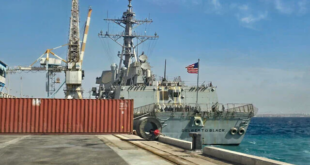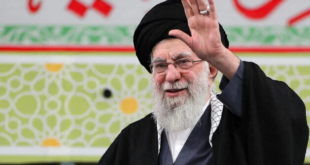 It has become increasingly obvious over the past few months that the U.S. government and its military-industrial cohorts, bogged down by insurgency in Iraq and desperately in need of a “victoryâ€, insensibly think that they can bomb, and possibly even nuke, Iran – a civilization far older and richer than theirs – back into the stone age, while the rest of the world, especially the Islamic world, watches in impotent horror, fury and sadness.
It has become increasingly obvious over the past few months that the U.S. government and its military-industrial cohorts, bogged down by insurgency in Iraq and desperately in need of a “victoryâ€, insensibly think that they can bomb, and possibly even nuke, Iran – a civilization far older and richer than theirs – back into the stone age, while the rest of the world, especially the Islamic world, watches in impotent horror, fury and sadness.
 Will Muslims and their governments keep quiet while this is going on and only wake up when it is too late, when the American terror rains bombs, devastation and destruction from the skies with impunity on largely civilian Iranian populations who will bear the brunt of the “collateral damage†– caused by a U.S. government that is getting more insane by the day?
Â
For that is what it is – insanity. Insanity even worse than that which produced the attacks on the New York World Trade Centre and which seemingly tipped the U.S. over the brink into an insensible and incomprehensible “war against terror†which itself has caused arguably a hundred times more casualties and deaths than the attacks on the WTC.
 Let us confront the truth of the matter – all U.S. actions so far have been calculated to destabilize the whole region, not to enhance security of the world. This will give them an excuse to intervene militarily and to have a commanding presence in all Muslim countries of the region. Why else would the U.S. be building the costliest embassy in the world – at a billion USD – in Iraq? Iraq will become just another colony of the U.S., once the purported threat from Iran has been neutralized or eliminated.
Â
What adequate response can the Muslim world have to an attack such as this? What retaliatory response would serve the purpose of dissuading any further insanity on the part of the U.S.? We have kept quiet long enough. The Muslim world must rise with one voice and tell America, “enough is enough!†If this is not enough, then we must be prepared for harder responses and measures.
 While the Muslim response must always be peaceful, the question is can it remain so in the face of extreme provocation by the U.S.? For that is what it is – deliberate and calculated provocation. There is a method in its madness and Muslims will have to respond adequately enough to prevent any further adventurism on the part of the U.S., while yet not rising to the bait. This will be a far deadlier bait than the Danish cartoons were.
Â
Professor Jorge Hirsh of the University of California San Diego has argued that a U.S.war against Iran could take place as early as the end of April, 2006 and that the pretext for this war would be an “imminent†biological threat emanating from Iran as opposed to the “by now-discredited nuclear threatâ€. (See http://www.informationclearinghouse.info/article12593.htm) (Also “Biological attack on West ‘simply a question of time’: US officialâ€)
 Whatever, we can trust the U.S. to manufacture a threat even if one didn’t exist. That is how low the U.S. has sunk in the esteem of the rest of the world, even if it doesn’t care to face this reality. Bullies and thugs never do.
Â
CNN has been rattling the sabers and beating the drums of war with Iran since as early as February 2005, possibly earlier. On its site on 18.2.05 is a link to a rather provocative video “How would U.S. troops match up in a war with Iran?†This is on the same page as a report of Putin saying he was convinced Iran was not developing nuclear weapons (See http://edition.cnn.com/2005/WORLD/meast/02/18/iran.russia/).
 Now what could that video be in aid of? Peace?
Â
One doubts that the U.S. would send ground forces into Iran to be mired in an even worse quagmire than that it finds itself in Iraq, but will probably opt for war from afar via aerial and naval bombardment, the objective being not to defeat Iran but to cripple it without suffering any loss of ground troops as well as minimizing loss of aircraft or naval vessels.
 This can be deduced from U.S. Conplan 8022, a Presidential Directive signed by Bush in January 2003, which calls for a highly concentrated strike combining bombing with electronic warfare and cyber attacks to cripple an opponent’s response—cutting electricity in the country, jamming communications and hacking computer networks. Conplan 8022 also explicitly includes a nuclear option, specially configured earth-penetrating ‘mini’ nukes, to hit underground sites such as Iran’s. (See “Calculating the Risk of War in Iran†by F. William Engdahl, 29.1.06).
Â
Even the Hon. Ron Paul of Texas, in his speech to the U.S. House of Representatives on 5.4.2006, hardly a week ago, has warned that Iran will be the next Neocon target. According to him,
 “…Though Iran is hardly a perfect democracy, its system is far superior to most of our Arab allies, about which we never complain. Already the coordinated propaganda has galvanized the American people against Iran for the supposed threat it poses to us with weapons of mass destruction that are no more present than those Saddam Hussein was alleged to have had.
Â
It is amazing how soon after being thoroughly discredited over the charges levied against Saddam Hussein the neoconservatives are willing to use the same arguments against Iran. It is frightening to see how easily Congress, the media and the people accept many of the same arguments against Iran that were used to justify an invasion of Iraq…
 …Even this apparent failure of policy (in Iraq) does nothing to restrain the current march towards a similar confrontation with Iran. What will it take us to learn from our failures? Common sense tells us the war in Iraq soon will spread to Iran. Fear of imaginary nuclear weapons or an incident involving Iran, whether planned or accidental, will rally the support needed for us to move on Muslim country number three…
Â
…There is no evidence of a threat to us by Iran and no reason to plan and initiate a confrontation with her. There are many reasons not to do so: Iran does not have a nuclear weapon and there is no evidence that she is working on one, only conjecture. Even if Iran had a nuclear weapon, why would this be different from Pakistan, India, and North Korea having one? Why should Iran have less right to a defensive weapon than these other countries? If Iran had a nuclear weapon, the odds of her initiating an attack against anybody, which would guarantee her own annihilation, are zero, and the same goes for the possibility she would place weapons in the hands of a nonstate terrorist group…
 …At present, the likelihood of reason prevailing in Congress is minimal…
Â
…The clincher in the National Security Document (The President’s 2006 National Security Strategy) is if diplomatic efforts fail, confrontation will follow. The problem is the diplomatic effort, if one wants to use that term, is designed to fail by demanding the Iranians prove an unprovable negative…
 …The President states: Iran’s “desire to have a nuclear weapon is unacceptable.†A desire is purely subjective and cannot be substantiated nor disproved. Therefore all that is necessary to justify an attack is if Iran fails to prove it does not have a desire to be like the United States, China, Russia, Britain, France, Pakistan, North Korea, India and Israel whose nuclear missiles surround Iran…
Â
…Hysterical fear of Iran is way out of proportion to reality…â€
 It is at once apparent that the US strategy is to purposely put Iran in a no-win situation no matter what Iran does. What can such twisted logic signify other than an all-consuming irrational belligerence at all costs and a reckless, even homicidal, disregard for human life and property? This purported “hysterical fear†of Iran is actually coldly calculated. America’s military-industrial complex is clearly out of control. Where is the real “axis of evil†now or has that become the “allies of evil�
Â
The U.S.’ own possession and use of weapons of mass destruction shows its blatant hypocrisy. As Michel Chossudovsky drily put it, “None of these weapons in the Pentagon’s “tool box”, including conventional bunker buster bombs, cluster bombs, mini-nukes, chemical and biological weapons are described as “weapons of mass destruction” when used by the United States of America and its coalition partners)â€. (“Is the Bush Administration Planning a Nuclear Holocaust? Will the U.S. launch “Mini-nukes” against Iran in Retaliation for Tehran’s “Non-compliance”?†by Michel Chossudovsky, 22.2.06).
¼br /> Seeking a convenient scapegoat for their failures in Iraq, the U.S. has even resorted to blaming Iran for the purported sectarian/civil strife now taking place, and for which there is evidence that the U.S. itself could be provoking – deliberately or ignorantly, or even setting up through special “black ops†operatives. That, however, is another story in itself.
 But all this death and destruction is actually good news to the U.S. military-industrial complex – which Dwight D. Eisenhower had forebodingly warned about in his farewell speech to the nation in 1961. It is what they want.
Â
Who after all are the chief beneficiaries of the more than USD 270 billion (conservatively) spent by the U.S. in the war on Iraq and which keeps increasing at the rate of USD5.8 billion a month? Certainly not the Iraqi people, who are now worse off than they were under Saddam except for the semblance of democracy. Of what use is such democracy if there cannot be peace?
 It is worthwhile quoting Eisenhower at some length, as his words appear to have been forgotten by most Americans today, especially by their government. They will fail to take heed only at their own peril, if they are able to overcome their own arrogance in being for the present time the world’s arguably richest and most powerful nation.
Â
As Eisenhower said then,
 “…We now stand ten years past the midpoint of a century that has witnessed four major wars among great nations. Three of these involved our own country. Despite these holocausts America is today the strongest, the most influential and most productive nation in the world. Understandably proud of this pre-eminence, we yet realize that America’s leadership and prestige depend, not merely upon our unmatched material progress, riches and military strength, but on how we use our power in the interests of world peace and human betterment.
Â
Throughout America’s adventure in free government, our basic purposes have been to keep the peace; to foster progress in human achievement, and to enhance liberty, dignity and integrity among people and among nations. To strive for less would be unworthy of a free and religious people. Any failure traceable to arrogance, or our lack of comprehension or readiness to sacrifice would inflict upon us grievous hurt both at home and abroad…
 …Crises there will continue to be. In meeting them, whether foreign or domestic, great or small, there is a recurring temptation to feel that some spectacular and costly action could become the miraculous solution to all current difficulties…
Â
…The record of many decades stands as proof that our people and their government have, in the main, understood these truths and have responded to them well, in the face of stress and threat. But threats, new in kind or degree, constantly arise. I mention two only.
 A vital element in keeping the peace is our military establishment. Our arms must be mighty, ready for instant action, so that no potential aggressor may be tempted to risk his own destruction.
Â
Our military organization today bears little relation to that known by any of my predecessors in peacetime, or indeed by the fighting men of World War II or Korea.
 Until the latest of our world conflicts, the United States had no armaments industry. American makers of plowshares could, with time and as required, make swords as well. But now we can no longer risk emergency improvisation of national defense; we have been compelled to create a permanent armaments industry of vast proportions. Added to this, three and a half million men and women are directly engaged in the defense establishment. We annually spend on military security more than the net income of all United States corporations.
Â
This conjunction of an immense military establishment and a large arms industry is new in the American experience. The total influence — economic, political, even spiritual — is felt in every city, every State house, every office of the Federal government. We recognize the imperative need for this development. Yet we must not fail to comprehend its grave implications. Our toil, resources and livelihood are all involved; so is the very structure of our society.
 In the councils of government, we must guard against the acquisition of unwarranted influence, whether sought or unsought, by the military-industrial complex. The potential for the disastrous rise of misplaced power exists and will persist.
Â
We must never let the weight of this combination endanger our liberties or democratic processes. We should take nothing for granted. Only an alert and knowledgeable citizenry can compel the proper meshing of the huge industrial and military machinery of defense with our peaceful methods and goals, so that security and liberty may prosper together…
 …Another factor in maintaining balance involves the element of time. As we peer into society’s future, we — you and I, and our government — must avoid the impulse to live only for today, plundering, for our own ease and convenience, the precious resources of tomorrow. We cannot mortgage the material assets of our grandchildren without risking the loss also of their political and spiritual heritage. We want democracy to survive for all generations to come, not to become the insolvent phantom of tomorrow.
Down the long lane of the history yet to be written America knows that this world of ours, ever growing smaller, must avoid becoming a community of dreadful fear and hate, and be instead, a proud confederation of mutual trust and respect.
Â
…You and I — my fellow citizens — need to be strong in our faith that all nations, under God, will reach the goal of peace with justice. May we be ever unswerving in devotion to principle, confident but humble with power, diligent in pursuit of the Nation’s great goals.â€
Â
A study (“The Economic Costs Of The War In Iraq: An Appraisal Three Years After The Beginning Of The Conflictâ€) by Linda Bilmes of the Kennedy School, University of Harvard and Joseph E. Stiglitz, University Professor, Columbia University states “with some degree of confidence†that these costs exceed a trillion U.S. dollars.
 The previous Gulf War or any other conflict pales by comparison. The U.S. has probably not even spent that much on Israel or even its own domestic welfare programmes over the last 30 years.
Â
One has really got to question whether the US is at all serious about peace in the Middle East or not. But peace will not be good news for the military-industrial complex, which will lose its very reason for existence and for the excessive spending that conflict and war bring. Never mind the cost in terms of innocent people’s lives lost and property destroyed – if they are Muslims, so much the better.
 We cannot be faulted for thinking that the last thing on their agenda is bringing about a safer world to live in and that they would rather prolong the “war on terror†as long as they can.
Â
Whatever the answer to these questions are, it is clear that all Muslims, Sunni or Shia, and even the whole world, are at risk and that Muslim countries must unite in more ways than one to face the threat of an increasingly irrational, belligerent and imperialist America and its allies. Make no mistake, the future of all Muslims and Islam and the very freedom of the world itself is at stake here.
 There are also still many right-thinking people in the West who can be counted on to assist in any peaceful way possible to avert an unprecedented yet avoidable disaster which will affect not just the Muslim world but the non-Muslim world as well.
 May Allah protect us from the Allies of Evil, but His Will be done.
 Eurasia Press & News
Eurasia Press & News



